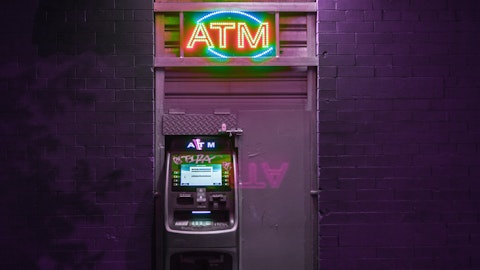Gerard Cassidy: Chris, you touched on in your opening remarks about the commercial mortgage servicing portfolio, I think you said $630 billion. Can you share with us the special servicing segment within that business? Obviously, with the challenges in the commercial real estate market, particularly in the CMBS market, I suspect your special servicing business has picked up, and maybe some color there?
Chris Gorman: Sure. Well, thanks for the question. It’s a great business – it’s a great business because it generates a bunch of deposits through escrows, which are more important today than they ever have been in my career. It’s also important because it’s countercyclical. So for those of you that aren’t as familiar with the business, we are the named special servicer when a large complex debt financing is put together. And so when you’re the named special servicer, you get sort of what I would think of as sort of a ticking fee. And then if, in fact, it goes into default, and this is all off us real estate, we are the workout agent. And to Gerard’s point, we just set for the second quarter in a row a record in terms of special servicing fees.
And so I think that will continue. And this won’t surprise you, Gerard, but more than two-thirds of what is in active special servicing is office. And I think that’s going to continue. And I think office is going to be — it’s not going to be a challenge for Key because it’s not an asset class we focus on. But I think office is going to continue to be a significant challenge.
Gerard Cassidy: And Chris, based on your experience with this, these fees stay with you for a while since the workout phase takes quite a bit of time?
Chris Gorman: Yes, it’s — these are very large — think of kind of very large advisory fees that take a lot of people. These are very complex capital structures. It’s not unusual for these fees on a single deal to be $5 million, $6 million, $7 million.
Gerard Cassidy: Great. And then sticking with this, can you share with us — just on the commercial loans, not commercial real estate necessarily, just what you guys are doing to get out in front of any potential challenges we could see if the economy? I know you said soft landing is what you’re thinking. But if the economy does lead to more delinquencies and defaults, what are you guys doing now in front of that?
Chris Gorman: Yes. Well, this is an area where we spend a lot of time. We are — as it relates to the C&I book, particularly focused on anything that has floating rate debt that’s leveraged. And so for us, our leverage book literally is the same than it was a decade ago. It’s under 2% of our loans and it’s focused on our industry verticals. But we are — there’s a lot of us — Mark Midkiff is in the room with me, who is our Chief Risk Officer, he and I and others are laying eyes on this. We feel really good about where the portfolio is. But any time you go into an environment where you have declining EBITDA and a business with a lot of leverage and the cost of capital going up, you got to pay close attention. And that’s where we pay very close attention. We feel good about — we feel really good about all of our portfolios, but that’s where I spend sort of my time because that’s what’s most vulnerable.
Gerard Cassidy: Thank you.
Chris Gorman: Thank you, Gerard.
Operator: And we’ll go next to Steven Alexopoulos with JPMorgan.
Steven Alexopoulos: Hi. Good morning, everyone.
Chris Gorman: Good morning, Steve Alexopoulos.
Steven Alexopoulos: I wanted to first follow up on your answer, Chris, to Ebrahim’s question. Are you signaling that the door is not open at all in terms of potentially rightsizing the dividend?





